
News
Behind the Headlines
Two-Cents Worth
Video of the Week
News Blurbs
Articles
Testimony
Bible Questions
Internet Articles (2015)
Internet Articles (2014)
Internet
Articles (2013)
Internet Articles (2012)
Internet Articles (2011)
Internet Articles (2010)
Internet Articles
(2009)
Internet Articles (2008)
Internet Articles (2007)
Internet Articles (2006)
Internet Articles (2005)
Internet Articles (2004)
Internet Articles (2003)
Internet Articles (2002)
Internet Articles (2001)



Does the State Department have an
agenda different than the White House?
By
Jon Christian Ryter
Copyright 2001 - All Rights Reserved
To distribute this article, please post this web address or hyperlink
December 15, 2001
During
the Gulf War in 1991, America created four heroes. Two of them
were civilians, two were military. The four men who emerged from Desert
Storm as heroes were George H.W. Bush, the 41st President of the
United States; Dick Cheney, then Secretary of Defense; Lt. General
H. Norman Schwarzkopf, commanding general “on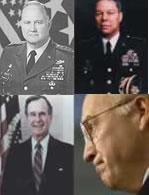 the
ground” in Saudi Arabia—and, of course, General Colin Powell,
Chairman of the Joint Chiefs. Fate would deal kindly with three of them.
President George H.W. Bush, who achieved a 91% approval rating
from the American people as the civilian “commander-in-chief”
of the victory over Saddam Hussein’s elite Republican Guard
in Kuwait, was denied re-election ten months later because he broke a
campaign promise not to raise taxes. Gen. Schwarzkopf became the
most popular military leader in the United States since George Patton
and Douglas McArthur. Dick Cheney, of course, became Vice
President of the United States and Gen. Colin
the
ground” in Saudi Arabia—and, of course, General Colin Powell,
Chairman of the Joint Chiefs. Fate would deal kindly with three of them.
President George H.W. Bush, who achieved a 91% approval rating
from the American people as the civilian “commander-in-chief”
of the victory over Saddam Hussein’s elite Republican Guard
in Kuwait, was denied re-election ten months later because he broke a
campaign promise not to raise taxes. Gen. Schwarzkopf became the
most popular military leader in the United States since George Patton
and Douglas McArthur. Dick Cheney, of course, became Vice
President of the United States and Gen. Colin 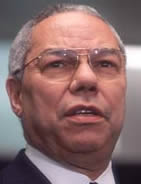 Powell,
who was eagerly pursued by both the Democrats and Republicans to seek
the office of President of the United States, opted to become Secretary
of State for President George W. Bush. (Powell, it will
be remembered, sat on the fence during the political fray over the Election
of 2000 when Bush could have used his help in quieting the voices
of dissent from the African-American community. Powell, who participated
in one photo op with Bush in Crawford, Texas—but did not speak
to the media on Bush’s position, nor did he try to quell black dissent
on the election. He was part of Bush’s team only insofar as
Bush was the only one to offer him the plumb State job. At the
same time, he kept his career options open by assuring the liberal mainstream
media during the fray that he was equally willing to serve in a Gore
administration.)
Powell,
who was eagerly pursued by both the Democrats and Republicans to seek
the office of President of the United States, opted to become Secretary
of State for President George W. Bush. (Powell, it will
be remembered, sat on the fence during the political fray over the Election
of 2000 when Bush could have used his help in quieting the voices
of dissent from the African-American community. Powell, who participated
in one photo op with Bush in Crawford, Texas—but did not speak
to the media on Bush’s position, nor did he try to quell black dissent
on the election. He was part of Bush’s team only insofar as
Bush was the only one to offer him the plumb State job. At the
same time, he kept his career options open by assuring the liberal mainstream
media during the fray that he was equally willing to serve in a Gore
administration.)
I guess that’s what makes Powell
a diplomat. He managed to keep his options alive on both sides of the
political coin as long as the Election of 2000 was up in the air.
At the conclusion of Desert Storm Powell
the military politician, not Stormin’ Norman, shined as the
War College genius who planned the strategy that resulted in an estimated
65,000 Iraqi soldiers killed (no actual body counts were ever done) and
71,204 captured to American losses of 293 dead and 467 wounded. (Unfortunately,
145 of the American dead were the result of either accidents or friendly
fire.) Iraq lost 3,700 of their 4,280 unit tank force. They lost 2,600
of their 3,110 artillery pieces. Iraq lost every airplane and helicopter
in their air force except the 137 aircraft they flew to their traditional
enemy, Iran, for safekeeping.
What
has, over the past decade, become known as the “Powell Doctrine”
since the Gulf War was in reality the “Weinberger Doctrine”
since Reagan’s Secretary of War, Casper Weinberger created
the philosophy and hammered it into the head of his chief military advisor,
Colin Powell. Powell biographers argue that Powell
learned the lesson through experience in Vietnam, and formulated the philosophy
after reading the book On War (which was written in 1830) when
he was a “student” at the National War College in the
early 1970s.
The reality is that the United Nations-style
“conduct of war” that was used by John F. Kennedy, Lyndon
B. Johnson and Richard M. Nixon to govern the conduct of war
both in Korea and in Vietnam doomed the Vietnamese war from the start
since America engaged in a “no-win” philosophy against a nation
that the United States should have overwhelmed and defeated in no more
than 90-days.
From the Kennedy Executive Order that led
to State Department Publication #7277, Freedom from War: The United
States Program for General and Complete Disarmament in a Peaceful World,
and expanded in May 1962, America was doomed to lose every war into which
it was thrust since it more forcefully added not only the 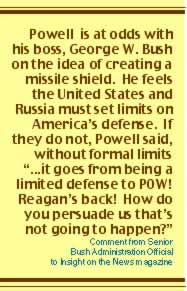 politicians
but the Council on Foreign Relations-influenced global diplomats
into the equation of waging war. War was no longer simple. Suddenly, global
political objectives were more important than the military ones, and American
soldiers became political pawns in a global chess game because the minute
the diplomats became part of the equation of war, so did the Council
on Foreign Relations who believed that instead of waging war, America
needed to seek diplomatic, power-sharing arrangements with the communist
nations in order to end the Cold War before it became too hot.
politicians
but the Council on Foreign Relations-influenced global diplomats
into the equation of waging war. War was no longer simple. Suddenly, global
political objectives were more important than the military ones, and American
soldiers became political pawns in a global chess game because the minute
the diplomats became part of the equation of war, so did the Council
on Foreign Relations who believed that instead of waging war, America
needed to seek diplomatic, power-sharing arrangements with the communist
nations in order to end the Cold War before it became too hot.
The CFR believed that if the United
States went to war with the thought of overwhelmingly defeating its enemy,
the Soviet Union would be obligated to enter the fray, and even the smallest
regional conflict had the potential to “go nuclear.”
Logic told Reagan—and Weinburger—that
America could not afford to help everyone. But Reagan willing to
surrender liberty for the form of communist-style freedom promoted by
the United Nations. America had to pick its fights based on whether or
not we, as a nation, had a vested interest in the fray. And, if America
decided to fight, it needed to overwhelm its enemy as quickly as possible
rather than allowing a conflict to drag on for years.
Dreaming up this military strategy was attributed
to Powell during the Gulf War. It created what would become part
of the Powell mystic, and would be used by Powell’s
supporters to suggest that the former Joint Chiefs Chairman should occupy
the White House. The strategy, as it was used in Kuwait and Iraq, was
advanced by Schwarzkopf and approved by Powell, Dick
Cheney and Bush. History, however, has a way of  crediting
the victories of the field commanders to their more high pro- file general
officers in Washington. Powell, the perennial politician accepted
the credit. Schwarzkopf, the perennial soldier, kept his mouth
shut.
crediting
the victories of the field commanders to their more high pro- file general
officers in Washington. Powell, the perennial politician accepted
the credit. Schwarzkopf, the perennial soldier, kept his mouth
shut.
Like many politically-astute but militarily
naive Americans, I viewed Powell as a potential President.
In fact, looking at the field of candidates available in 2000, Powell
would have been the only real threat to the nomination of George W.
Bush. Had Powell announced early-on that he would seek the
Republican presidential nomination in 2000, I would have lent my support
to his campaign. I started to wonder about Powell when he visited
with Prince Bernhardt of the Netherlands and attended the Bilderberger
Conference. It was unclear if the Bilderbergers were planning
to back Powell when the CFR/transnationalist money was backing
Bush. The last time that happened was in 1976 when the Bilderbergers
backed Gerald Ford and the CFR and David Rockerfeller backed Jimmy
Carter. It may well have been that Powell was planning to launch
a “test” campaign but was convinced by the globalists that he
could “serve” better as Secretary of State. We will likely never
know since we get to view history only from the perspective of which things
happen.
What we do know from the perspective of
history is that the National Security team of the White House headed by
National Security Director Condoleezza Rice is now attempting to
dismantle the failed national defense policies of the Clinton-GoreAdministration—and
the Clinton holdovers and the bureaucratic arms control liberals in the
State Department who are convinced they can manipulate Powell to
help them, are doing everything in their power to throw a political monkey
wrench into the works.
The December 24 issue of Insight on the
News (www.insight-mag.com) (available at the newsstand or by calling
202-636-8887) will reveal that a fourth-echelon arms-control doyenne
leaked internal policy material to foreign governments in the hope that
they would protest and thus help Secretary Powell pre-empt
Bush’s new, assertive programs. Why would the Clinton holdovers
and the institutionalized liberal bureaucrats believe that Powell could
be manipulated that easily?
Over the years Powell has not minced
words on his opinion of the Reagan-era missile shield. Bill Keller,
writing in a New York Times Magazine profile on Powell that
was supposed to show that Powell was actually controlling American
foreign policy, said: “Powell’s suspicion of missile
defense was nourished at its genesis, President Reagan’s Strategic
Defense Initiative, which the young Pentagon aide [Powell]
watched with a kind of amused horror. Reagan, God bless him, was
forever talking about this shield and, you know, ‘We’re just
going to make all offensive weapons useless,’ Powell recalled,
rolling his eyes.”
Powell’s attitude, which has
not changed much since 1982, now puts George W. Bush’s evolving missile-shield
policies at odds with the agenda of the Secretary of State who, like former
Vice President Al Gore, Jr., views SDI as the whimsical
fantasy of a science fiction buff, not as a serious defense strategy.
Powell now poophahs 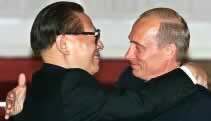 George
W. Bush who intends to remove the fate of the American people from
the diplomats who negotiate one-sided paper treaties crafted at the Council
on Foreign Relations that penalize the United States while allowing
both China and the former Soviet Union to modernize their missile systems—and,
at the same time, reward them with most favored nation status as they
sell biological weapons and nuclear weapon technology to oil rich terrorists
in the Mideast—believing somehow that consumer “favors”
will make our former enemies toe the “free enterprise” line
and become genuine democracies in which the liberty of mankind—not
the artificial freedom of communism—is sacrosanct.
George
W. Bush who intends to remove the fate of the American people from
the diplomats who negotiate one-sided paper treaties crafted at the Council
on Foreign Relations that penalize the United States while allowing
both China and the former Soviet Union to modernize their missile systems—and,
at the same time, reward them with most favored nation status as they
sell biological weapons and nuclear weapon technology to oil rich terrorists
in the Mideast—believing somehow that consumer “favors”
will make our former enemies toe the “free enterprise” line
and become genuine democracies in which the liberty of mankind—not
the artificial freedom of communism—is sacrosanct.
In the last few weeks several of Bush’s
key lieutenants, including Secretary of Defense Donald Rumsfeld
and Deputy Defense Secretary Paul Wolfowitz, discovered what one
Bush lieutenant privately defined as “rank insubordination”
not only within the 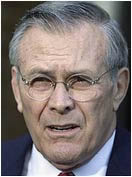 State
Department but elsewhere in the Bush Administration as Clinton
moles busy themselves deliberately undermining Bush’s agenda.
The Bush “source” told Insight on the News reporter
J. Michael Waller that “...some U.S. officials opposed to
the new policy have collaborated with foreign governments to embarrass,
discredit and undermine the president’s own representatives and thereby
prevent his policies from being implemented, even after the September
11 attacks.
State
Department but elsewhere in the Bush Administration as Clinton
moles busy themselves deliberately undermining Bush’s agenda.
The Bush “source” told Insight on the News reporter
J. Michael Waller that “...some U.S. officials opposed to
the new policy have collaborated with foreign governments to embarrass,
discredit and undermine the president’s own representatives and thereby
prevent his policies from being implemented, even after the September
11 attacks.
(Interestingly, when it going on within
the various Executive Branch departments of the Bush Administration
is precisely what former-Clinton aide Larry Nichols wrote about
in his book, The
Genie Is Out of the Bottle, and what Nichols preached
on his radio talk show until he was sufficiently  poophahed
by his former loyal listening audience that, in frustration, Nichols
gave up his radio program. Nobody believed him. The Bush people,
who are now talking to him, do. Just after the inauguration, I was asked
by an “agent” of another Bush lieutenant to help them
learn the names of Clinton moles before they cleared their probationary
periods and could no longer be terminated. I enlisted the support of a
Justice Department attorney to help the Bush team find the moles
before it was too late. There were, I understood at the time, several
hundred scattered throughout all of the Executive Branch departments.
How many were found and terminated is anyone’s guess. But what is
going on now suggests that far too many of them were missed.)
poophahed
by his former loyal listening audience that, in frustration, Nichols
gave up his radio program. Nobody believed him. The Bush people,
who are now talking to him, do. Just after the inauguration, I was asked
by an “agent” of another Bush lieutenant to help them
learn the names of Clinton moles before they cleared their probationary
periods and could no longer be terminated. I enlisted the support of a
Justice Department attorney to help the Bush team find the moles
before it was too late. There were, I understood at the time, several
hundred scattered throughout all of the Executive Branch departments.
How many were found and terminated is anyone’s guess. But what is
going on now suggests that far too many of them were missed.)
You might reasonably argue that since those
problems appear to be caused by Clinton holdovers in the State Department
that Colin Powell cannot be blamed for their misdeeds. Not
true. The buck stops at the Secretary’s desk. The boldness of the
Clinton holdovers comes from the fact that they see, if not an
ally in Powell, at least a man who philosophically agrees with their position.
Prior to September 11 Powell’s liberal societal views were
the hope of former communists in the Eastern block and the socialists
in western Europe. Upon assuming the position of Secretary of State Powell,
the paradoxical commander, set about solidifying his fiefdom. Rather than
allow the President to fill the key Assistant Secretary jobs—the
people who implement the president’s foreign policy decisions in
the six regions of the globe—Powell demanded the right to
“handpick” his “team.” Bush agreed. Believing
he would nevertheless have “first refusal rights” on Powell’s
“candidates,” Bush discovered he had his own Hillary
(whom you will recall demanded the right to pick all domestic appointees
in the first Clinton Administration as her price for “standing
by her man” when the Gennifer 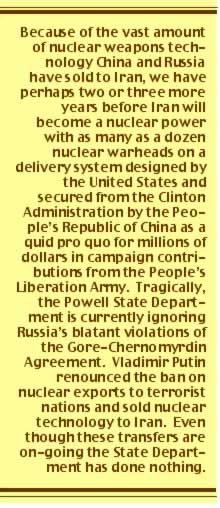 Flowers
scandal [made public by Larry Nichols]) arose. Powell intended
to keep first and final refusal rights within the State Department. Instead
of either submitting a list of potential political candidates—who
would agree philosophically with the views and positions of the President—Powell
filled the positions with career Foreign Service officers. Statistically,
over 2/3 of the highest ranking career Foreign Service bureaucrats are
politically liberal. In his profile of Powell, Keller admiringly
noted that “...whether by design or not (Powell’s people
insist not), this had the additional affect of assuring that those jobs
would not go to White House political appointees whose views were to the
right of [Powell’s].”
Flowers
scandal [made public by Larry Nichols]) arose. Powell intended
to keep first and final refusal rights within the State Department. Instead
of either submitting a list of potential political candidates—who
would agree philosophically with the views and positions of the President—Powell
filled the positions with career Foreign Service officers. Statistically,
over 2/3 of the highest ranking career Foreign Service bureaucrats are
politically liberal. In his profile of Powell, Keller admiringly
noted that “...whether by design or not (Powell’s people
insist not), this had the additional affect of assuring that those jobs
would not go to White House political appointees whose views were to the
right of [Powell’s].”
Once the coup d’ etat was over,
surprised Bush people grumbled that the problem was that everyone
in the Bush Administration is far to right of Powell.
Defending his father, Michael Powell
chided the Bush people as if they were all sucking sour grapes,
adding that he and his father were not the liberals many of the Bush people
thought they were. “What we are,” he said, “are moderates.”
It is beginning to appear that Colin Powell is about as
moderate as Bill and Hillary Clinton.
As Bush’s national security team: Condoleezza
Rice, Donald Rumsfeld, Dick Cheney, John R. Bolton, Paul Wolfowitz, Douglas
Feith, J.D. Crouch and Peter Rodman, attempt to overturn the
liberal establishment’s idea that national security is best ensured
by one-sided treaties, Powell made it clear he was opposed to scraping
the Salt II Treaty that Vladimir Putin did not sign until
Bush began talking about a missile shield over North America. Most
Americans are unaware that from 1979 until Putin signed the Treaty
last year, the United States signed a letter of agreement with the Soviet
Union that they would honor the terms of the Treaty while the Soviet Duma
debated the Treaty’s merits. Although the Soviets had not signed
the Treaty, and were still manufacturing missiles, the United States,
on the advise of its career Foreign Service experts, began reducing the
number of nuclear missiles even though it had firm evidence that the Soviets
were continuing to amass weapons of mass destruction.
The Bush team, it appears is ready
to junk the 1979 ABM Treaty just as Putin junked the illegal
Gore-Chernomyrdin Agreement that forbade him from selling nuclear
technology or nuclear weapons to a terrorist nation. Standing in the wings
is Powell who, paradoxically, has gained new life in the arms-control
arena first on September 11 and then a month later when the FBI
learned that Osama bin Laden had not only secured several radiological
devises (dirty bombs that contaminate large areas with
deadly radioactivity) but had managed to smuggle them into the United
States through ports-of-entry in Texas, New Mexico and California.
As the Bush team hammered out the
definition of what constituted a terrorist state—and the fact that
any nation that supplied a terrorist state (Iran has been classified as
a terrorist nation) would themselves be classified as a terrorist nation—Powell
saw an opportunity in the September 11 events to pressure Russia to join
the United States in its war on terrorism as he pressured the White House
to back down from its hard stance on ditching the ABM Treaty—a
treaty that the Council on Foreign Relations wants to maintain.
In point of fact, the Salt II ABM Treaty
was not negotiated between Russia and the United States, it was negotiated
between the Soviet Union and the United States. Russia is just one of
the “states” within that sphere with whom the treaty must now
be confirmed in order for it to be legally construed as binding. When
the Soviet Union broke up, the treaty scrapped itself since the geographic
and hierarchical entity with whom the United States signed it—the
Soviet Union—theoretically no longer existed. However, since Russia
knows that the Soviet Union merely went underground until such time as
events necessitate its “rebirth,” in their minds, the treaty
is still valid—and thus, remains binding on the United States.
 America
is in a security quandary caused by bad treaties instigated by the Council
on Foreign Relations and negotiated and signed by former Presidents
and their Secretaries of State. The series of “bad treaties”
that were seriously detrimental to the security interests of the United
States started with Richard Nixon and were followed by Jimmy
Carter’s foreign policy disasters that led to the giveaway of
the Panama Canal
America
is in a security quandary caused by bad treaties instigated by the Council
on Foreign Relations and negotiated and signed by former Presidents
and their Secretaries of State. The series of “bad treaties”
that were seriously detrimental to the security interests of the United
States started with Richard Nixon and were followed by Jimmy
Carter’s foreign policy disasters that led to the giveaway of
the Panama Canal  (the
was instigated by CFR policy wonk Madeleine Albright who
went on to become Secretary of State for Bill Clinton, under whose
administration the giveaway was completed) that was assumed, in 2000,
by the People’s Republic of China—giving America’s worst
enemy a foothold in the western hemisphere. Carter was also at
the helm of the U.S.S. America ship of state when CFR policy, implemented
through Carter’s State Department, caused the overthrow of
Iranian Shah Riza Pahlavi in favor of Shi’ite cleric Ayatollah
Ruhollah Khomeini. That State Department fiasco tilted the balance
of power in the Mideast from moderate Sunni Muslim regimes to those of
Shi’ite extremists like Saddam Hussein, Hafiz Assad and Yassar
Arafat. (Carter’s foreign policy decisions also led to
the overthrow of Anastasio Somoza of Nicaragua and Omar Torrijos
of Panama.)
(the
was instigated by CFR policy wonk Madeleine Albright who
went on to become Secretary of State for Bill Clinton, under whose
administration the giveaway was completed) that was assumed, in 2000,
by the People’s Republic of China—giving America’s worst
enemy a foothold in the western hemisphere. Carter was also at
the helm of the U.S.S. America ship of state when CFR policy, implemented
through Carter’s State Department, caused the overthrow of
Iranian Shah Riza Pahlavi in favor of Shi’ite cleric Ayatollah
Ruhollah Khomeini. That State Department fiasco tilted the balance
of power in the Mideast from moderate Sunni Muslim regimes to those of
Shi’ite extremists like Saddam Hussein, Hafiz Assad and Yassar
Arafat. (Carter’s foreign policy decisions also led to
the overthrow of Anastasio Somoza of Nicaragua and Omar Torrijos
of Panama.)
For the security of the United States of
America, the Bush Administration must completely dismantle four
decades of lopsided non-proliferation treaties (from 1960 to 1999) that
were deliberately designed to penalize only the United States (due to
a Kennedy-era belief that if the United States unilaterally disarmed that
Russia would do likewise). While few Americans today realize it, four
decades of shortsighted foreign policy decisions and detrimental treaty
terms have left us in an unbelievable quandary: all
of those treaties assumed America would face only one nuclear super power
enemy. None assumed that America might face both China and
the Soviet Union at the same time.
None of the nonproliferation or disarmament
treaties America entered into with the former Soviet Union allow the United
States to amass additional nuclear weapons to deal with nuclear threats
from the People’s Republic of China. But more important, none of
those treaties allow the United States to either add additional inventories
of missiles or build a defense shield against the eventuality that a terrorist
nation like Iran,  Iraq,
Yemen or Libya might somehow buy, build, steal and launch either biological
or nuclear weapons against the United States.
Iraq,
Yemen or Libya might somehow buy, build, steal and launch either biological
or nuclear weapons against the United States.
It is this eventuality that the Bush
Administration is now dealing with. Prior to September 11 few people
would have believed that terrorists could have wrought such devastation
on the United States. Today, knowing they can, the Administration is taking
steps to safeguard the nation by scrapping Cold War-era treaties that
do not deal with post-September 11 realities. Since attacks from terrorists
are more likely to occur over the next decade than nuclear attacks from
the former Soviet Union or the People’s Republic of China (which
openly admits it is still a decade away from launching a full scale nuclear
strike on the United States), and because the terrorists have shown an
almost eager willingness to die in order to destroy America, the MAD philosophy
(mutually-assured destruction) will not deter them. Therefore, because
our newest enemies don’t care if they die as they destroy America,
the United States must have the ability to protect itself other than traditional
retaliatory options that will not work against a terrorist state. A missile
shield is our only viable option.
Clearly the September 11 attack strengthened
Bush’s hand because it forced the diplomatic world to awaken
to the reality that small enclaves of terrorists could not only declare
war on a major power, but it could successfully wage such a war as well.
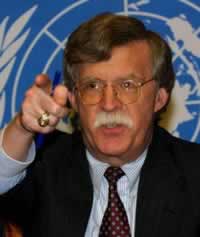 When
Undersecretary of State John R. Bolton addressed the International
Biological Weapons Convention in Geneva, Switzerland on November 19
he took the opportunity to lay out America’s position on dealing
with terrorist nations and nations that supply, protect, or otherwise
aid terrorist states. “Just as we can no longer rely solely on traditional
means to fight a war against terrorism, we need to look beyond traditional
arms-control measures to deal with the complex and dangerous threats posed
by biological weapons. The time for ‘better than nothing’ protocols
is over. It is time for us to consider serious measures to address the
biological weapons threat. It is time to set aside years of diplomatic
inertia. We will not be protected by a ‘Maginot Treaty’ approach
to the biological weapons threat.”
When
Undersecretary of State John R. Bolton addressed the International
Biological Weapons Convention in Geneva, Switzerland on November 19
he took the opportunity to lay out America’s position on dealing
with terrorist nations and nations that supply, protect, or otherwise
aid terrorist states. “Just as we can no longer rely solely on traditional
means to fight a war against terrorism, we need to look beyond traditional
arms-control measures to deal with the complex and dangerous threats posed
by biological weapons. The time for ‘better than nothing’ protocols
is over. It is time for us to consider serious measures to address the
biological weapons threat. It is time to set aside years of diplomatic
inertia. We will not be protected by a ‘Maginot Treaty’ approach
to the biological weapons threat.”
What Bolton meant is that there is
now one primary difference in US policy from the previous administration:
the Bush Administration would not place any reliance on the thin
hopes that other nations—including Russia and China—would not
violate treaties they had previously signed. In Bush’s mind,
a missile shield offered the best guarantee against incoming nuclear missiles
from either of our “former” enemies (Russia or China) or from
a rogue terrorist state like Iran or Iraq or even a rogue terrorist cell
group like Osama bin Laden.
Powell, in the meantime, has built
a very fragile coalition among those who believe that America must have
Russia’s cooperation in the war on terrorism to prevail; and that
the United States cannot scrap the 1979 ABM Treaty and then expect
that needed cooperation. To Powell, as with most globalists who
understand that if America is safely nestled under a laser umbrella called
SDI it will remain forever an isolationist nation since it will
have no reason to surrender its sovereignty to a global political hierarchy
in exchange for security.
Discussing the Bush Administration
plans to implement SDI, Powell told Keller: “It
 goes
from being a limited defense to POW! Reagan’s back. How do
you persuade us that’s not going to happen?”
goes
from being a limited defense to POW! Reagan’s back. How do
you persuade us that’s not going to happen?”
Frankly,
Bush has no intention in doing that. As far as he was concerned,
with both Russia and China supplying terrorist nations with nuclear weapons
technology, Bush intended to implement SDI. As the Bush
team laid the groundwork for withdrawing from the 1979 Salt II Treaty
if Vladimir Putin refused to budge on America’s right to defend
itself from the threat from rogue terrorist states or cell groups, a senior
level Bush official admitted that America would simply exercise
its right to withdraw from the treaty.
There is a genuine fear from Bush
loyalists that there will be a State Department effort to sabotage the
missile shield, first, since the State Department views détente
with China and the former Soviet Union as a State Department, not White
House, prerogative; and second, Powell is convinced that peace
can only be achieved if all nations are equally vulnerable to destruction.
Ignored by Powell and the State Department
was the fact that both Russia and China have chosen, whenever the need
to do so arose, to break whatever treaty or accord stood in the way of
their national objectives since the United States has traditionally ignored
their infractions without extracting any penalty. When Russia broke the
Gore-Chernomyrdin Accord and sold nuclear missile technology to
Iran, the Clinton-Gore Administration continued to funnel billions
of American taxpayer dollars into Russia’s economic recovery plan.
This happened even though the State Department had evidence that the high
tech weapons exports from Russia to Iran had been personally approved
by Putin—and those from China had been approved by Party Chairman
Jiang Zemin.
The real tragedy of it all is that Powell’s
view of the world, and his role in it, is much different from that of
his boss, the President. Powell’s world view more closely
resembles that of former President Bill Clinton and Al Gore
than it does George W. Bush. Powell appears to be far more
comfortable with intersectoral international alliances and institutions
than Bush. Furthermore, probably because Powell has spent his entire
adult life in the military, he is less assertive in the promotion of American-style
liberty and values abroad than a “civilian” in the same position.
Tragically, among Powell’s most ardent supporters is George
H.W. Bush who sees nothing wrong with his former Joint Chiefs’
Chairman efforts to redirect the foreign policy decisions of his son,
the current president—particularly where missile defense, the war
on terrorism, and the People’s Republic of China are concerned.
When Bush pledged to build a missile
shield over North America to protect the United States from the genuine
threat that terrorist nations like Libya, Iraq or Iran, or perhaps even
a well-funded rogue terrorist organization like al Qaeda might
get their hands on guided missiles with nuclear warheads, Powell
contradicted Bush by declaring what Bush “really meant”
was that while the 1972 and 1979 ABM treaties might need to be “patched”
here and there, they had to be preserved for the foreseeable future. Abandoning
the treaties all together, Powell believed, would cause the loss
of European and Russian goodwill. That, of course, is likely a true statement.
However, when terrorists took down the World Trade Center, “ground
zero” was not in London, Paris or Moscow. It was in New York. And,
while close to two thousand of those who died in that tragedy were international
citizens, over 4,600 Americans (now reduced to between 3,400 to 3,500
because of name duplication) died because this nation lacked the means
to protect them. There is no amount of European or Russian “goodwill”
that will offset the loss of American life. Europe does not want the United
States building a missile shield out of fear that the Cold War will heat
back up. If a rogue nation launches a nuclear armed guided missile at
the United States and destroys New York, Chicago, St. Louis or Los Angeles,
the only goodwill Europe or Russia would send would be their expressions
of sympathy.
When Bush declared his war on terrorism
using the words of Undersecretary of State for Arms Control and NonproliferationJohn
R. Bolton to explain that “...if you harbor...or train or arm...or
feed or fund a terrorist, you’re a terrorist,” Powell
took it upon himself to clarify what Bush “really meant.”
Powell gave Bush’s speech
the politically-correct diplomatic, State Department spin by declaring
that terrorists are not terrorists if they are on America’s side.
Interestingly, Bush has made his same terrorist speech at least
a dozen times since Powell clarified what he “really meant,”
and not once did Bush mitigate his position by saying that a terrorist
is not a terrorist if they are on America’s side.
Powell, who was actually on the “wrong
side of history” in 1991 when he objected to going to war with Saddam
Hussein—and convinced George H.W. Bush to stop short of
a complete victory and allow Saddam Hussein to escape punishment—now
appears to be doing everything possible to sow the seeds of confusion
over the wisdom of carrying the current war against terrorism beyond the
borders of Afghanistan. Rumsfeld, Bolton (who, as an Undersecretary
of State, theoretically reports to Powell), Condoleezza Rice,
Wolfowitz and Defense Undersecretary Feith each view Powell’s
brand of statecraft as rank insubordination. They believe that Powell’s
underlings—whether they are Clinton holdovers or not—have
both openly and covertly collaborated with pro-Muslim foreign governments
to deliberately embarrass Bush’s representatives and undermine
Bush’s war on terrorism in an attempt to prevent Bush’s
post-September 11 policies from being implemented. Rumsfeld and
Powell have locked horns on “war policy” at least twice
since the bombings in Afghanistan began. Rumsfeld has won each
confrontation with the Secretary of State. Rumsfeld has won the
popularity war with the American people as well. At present, Rumsfeld’s
daily news coverages rank among the highest watched “programs”
on TV. And Powell, whose hero’s veneer has worn transparently
thin, is a man in search of a Neilson legacy.



Copyright © 2009 Jon Christian Ryter.
All rights reserved.


